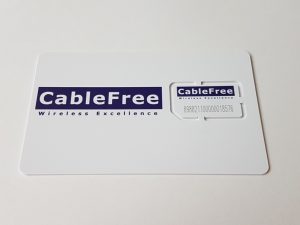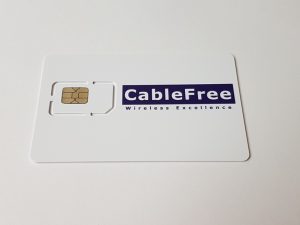CableFree SIM cards for 4G LTE & 5G NR Networks
Custom SIM cards are available for operators using CableFree LTE equipment. SIM cards can be customised with operator branding and specific information. A compatible SIM card is required in all LTE & 5G networks to enable the User Equipment (UE) CPE device to connect to the LTE or 5G network. For Private LTE networks, the SIM cards are programmed with suitable data to enable access just by relevant devices and users.
CableFree Custom SIM cards

Customisable Branding for SIM cards
The Front and Rear of the SIM cards are customisable with branding and user instructions.
The IMSI number and any other required customer/user-specific identifiers can be printed on the card also. Shown above is a unique IMSI number.

SIM card Data
The various data stored on the SIM card include the IMSI, Ki and OPc which are required to connect the device to the LTE Network. These are specific to each LTE network and are specified by the Network Operator.
IMSI
The International Mobile Subscriber Identity or IMSI is used to identify the user of a cellular network and is a unique identification associated with all cellular networks. It is stored as a 64 bit field and is sent by the phone to the network. It is also used for acquiring other details of the mobile in the home location register (HLR) or as locally copied in the visitor location register.
Authentication key (Ki)
The Ki is a 128-bit value used in authenticating the SIMs on a GSM mobile network (for USIM network, you still need Ki but other parameters are also needed). Each SIM holds a unique Ki assigned to it by the operator during the personalization process. The Ki is also stored in a database (termed authentication center or AuC) on the carrier’s network.
SIM card Security
CableFree SIM cards feature the latest in security.
The COMP128 algorithms are implementations of the A3 and A8 algorithms defined in the GSM standard. The A3 algorithm is used to authenticate the mobile station to the network. The A8 algorithm is used to generate the session key used by A5 to encrypt the data transmitted between the mobile station and the BTS.
Several COMP128 algorithms were designed and are in use:
COMP128-1 – original algorithm with known weaknesses
COMP128-2 – stronger algorithm which still clears the 10 rightmost bits of Kc
COMP128-3 – same algorithm as COMP128-2 with all 64 bits of Kc generated
COMP128-4 – based on the 3GPP (3rd Generation Partnership Project) algorithm “Milenage”, which uses AES
Privacy and Roaming
SIM cards provided by CableFree are typically dedicated to work just to the user network where roaming on/off the network is deliberately not supported. This is because the customer networks are often “closed” in nature and there is no support for billing of users who roam into the network.
Physical Sizes
SIM cards have been made smaller over the years; functionality is independent of format. Full-size SIM were followed by mini-SIM, micro-SIM, and nano-SIM. SIM cards are also made to be embedded in devices.
For most Outdoor, Desktop and MiFi LTE CPE devices, mini-SIM (2FF) is most popular. In the samples above, the 2FF format can be “snapped out” by the user when installing. Optionally, smaller outline SIMs are available. Mini-SIM (or 2FF), Micro-SIM (or 3FF), Nano-SIM (or 4FF)
| SIM card | Introduced | Standard reference | Length (mm) | Width (mm) | Thickness (mm) | Volume (mm3) |
|---|---|---|---|---|---|---|
| Full-size (1FF) | 1991 | ISO/IEC 7810:2003, ID-1 | 85.60 | 53.98 | 0.76 | 3511.72 |
| Mini-SIM (2FF) | 1996 | ISO/IEC 7810:2003, ID-000 | 25.00 | 15.00 | 0.76 | 285.00 |
| Micro-SIM (3FF) | 2003 | ETSI TS 102 221 V9.0.0, Mini-UICC | 15.00 | 12.00 | 0.76 | 136.80 |
| Nano-SIM (4FF) | early 2012 | ETSI TS 102 221 V11.0.0 | 12.30 | 8.80 | 0.67 | 72.52 |
| Embedded-SIM (eSIM) |
JEDEC Design Guide 4.8, SON-8 ETSI TS 103 383 V12.0.0 GSMA SGP.22 V1.0 |
6.00 | 5.00 | <1.00 | <30.00 |
Product Data
For Further Information
Please Contact Us for more information on our exciting range of solutions using LTE technology

You must be logged in to post a comment.